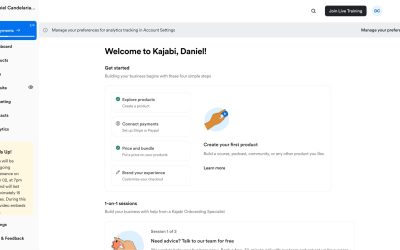Starting your own business requires you to handle all aspects of running a business, from marketing and sales to scheduling and billing. Even when you have processes for these parts of your business up and running, they can take away valuable time from focusing on what made you passionate about your field in the first place.
That’s why many business owners are opting to use an all-in-one online business platform to help things run smoothly. These platforms may provide a range of tools and features, including a landing page builder, email marketing campaigns, lead generation assistance, and other related options.
But with so many options out there, how do you choose the right platform for your needs? To help you make that decision, let’s take a closer look at two popular platforms in the market – Kajabi and Kartra – and see how they stack up against each other.
We will compare the two on more than 15 different criteria, including features, pricing, user experience, integrations, and customer support.
By the end of this article, you should have a comprehensive understanding of which platform is the best choice for your business, and which one will help you achieve your goals and grow your online business.
Kartra vs Kajabi: How They Differ
While both Kartra and Kajabi offer a similar range of features, they have their own unique strengths and weaknesses.
Kajabi, for example, is a more comprehensive platform that offers a wider range of features and tools. However, it can also be more expensive, with pricing plans starting at $149 per month.
Karta, on the other hand, is more focused and streamlined, making it a good choice for course creators who want a simple, easy-to-use platform. Its pricing starts at $119 per month.
It is worth noting that while both Kajabi and Kartra offer similar features, they are not identical in terms of their offerings. For instance, Kajabi is known for its advanced marketing automation capabilities, while Kartra is known for its advanced affiliate management features.
Both are powerful platforms for creating and selling digital products, but there are some key differences between them. Here are just some of the ways that these two platforms differ:
Target Audience
Kajabi is primarily designed for course creators, coaches, and entrepreneurs who want a comprehensive platform for building and selling digital products. Alternatively, Kartra is designed for a broader audience, including online businesses, e-commerce stores, and even brick-and-mortar businesses.
User Interface
Kajabi has a sleek, modern user interface that is easy to navigate and use. Alternatively, Kartra may have an interface that can be a bit overwhelming for some users.
Pricing
Both platforms offer a range of pricing plans to suit different needs and budgets, but Kartra is generally less expensive than Kajabi. Kartra’s Starter Plan starts at $99 per month, while Kajabi’s Basic Plan starts at $149 per month.
Features
Kajabi and Kartra are both all-in-one marketing platforms that provide features for creating and selling online courses, memberships, and digital products. Both platforms offer website builders, email marketing tools, sales funnels, and affiliate management features.
Kajabi specializes in creating online courses, while Kartra offers more advanced features for e-commerce and funnel building. Overall, both have a wide range of features that help you run many parts of your business, but the feature set is not exactly the same.
Integrations
Kajabi offers integrations with a wide range of tools and software, including Zapier, Mailchimp, and Shopify. Kartra also offers integrations with popular tools like Zapier and Mailchimp, but it doesn’t have the same level of integration options as Kajabi.
Overall, both Kartra and Kajabi are powerful platforms for creating online courses and selling digital products. The right choice for you will depend on your specific needs and goals.
Feature Comparison: Kartra vs Kajabi
When it comes to creating and selling digital products, Kajabi and Kartra offer a range of powerful features. Here’s a comparison of some of the key features of these two platforms:
[insert table]
As you can see from the table above, Kajabi and Kartra offer a similar range of features, including website building, email marketing, payment processing, and more.
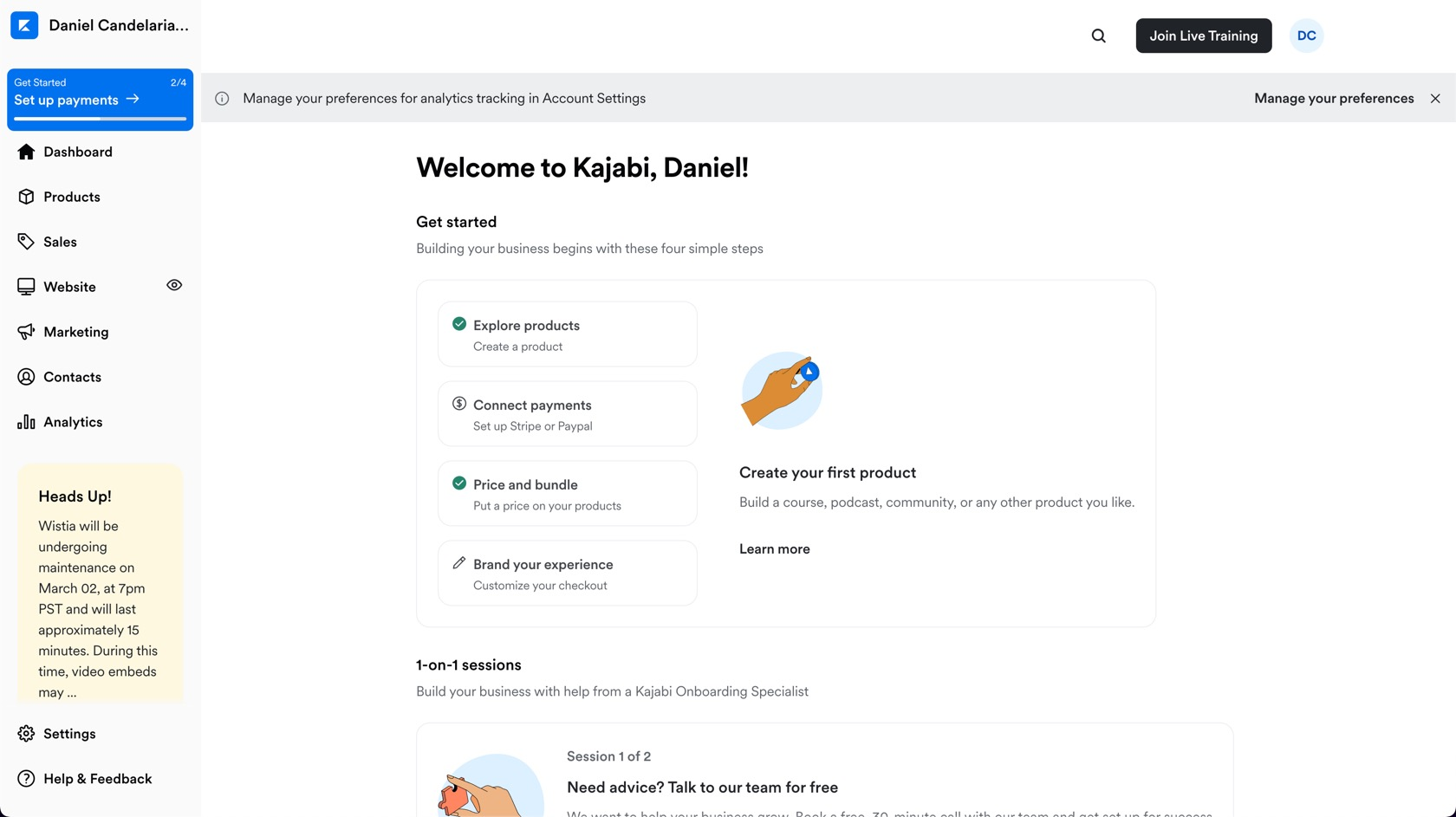
The page you’re first greeted with after creating a Kajabi Account.
Key Kajabi Features
Kajabi, an online course platform, is a robust platform designed for creating and selling digital products. With its numerous key features, Kajabi helps users establish thriving online businesses. Let’s explore some of the top features of Kajabi:
Course Creation
Kajabi offers a user-friendly course creation tool that allows users to easily create and manage online courses, including video lessons, quizzes, and other multimedia content.
Website Building
Kajabi’s page builder allows users to create custom, mobile-responsive websites that can be fully integrated with their digital products and marketing campaigns.
Email Marketing
Kajabi’s email marketing tool makes it easy to create and send targeted email campaigns to subscribers and customers, with customizable templates, automated sequences, and detailed analytics.
Membership Site Management
With Kajabi, users can create and manage membership sites with ease, allowing them to offer exclusive content and experiences to their most loyal customers.
Sales Funnels
Kajabi’s sales funnel builder makes it easy to create high-converting sales funnels that guide prospects through a series of steps to purchase a product or service.
Key Kartra Features
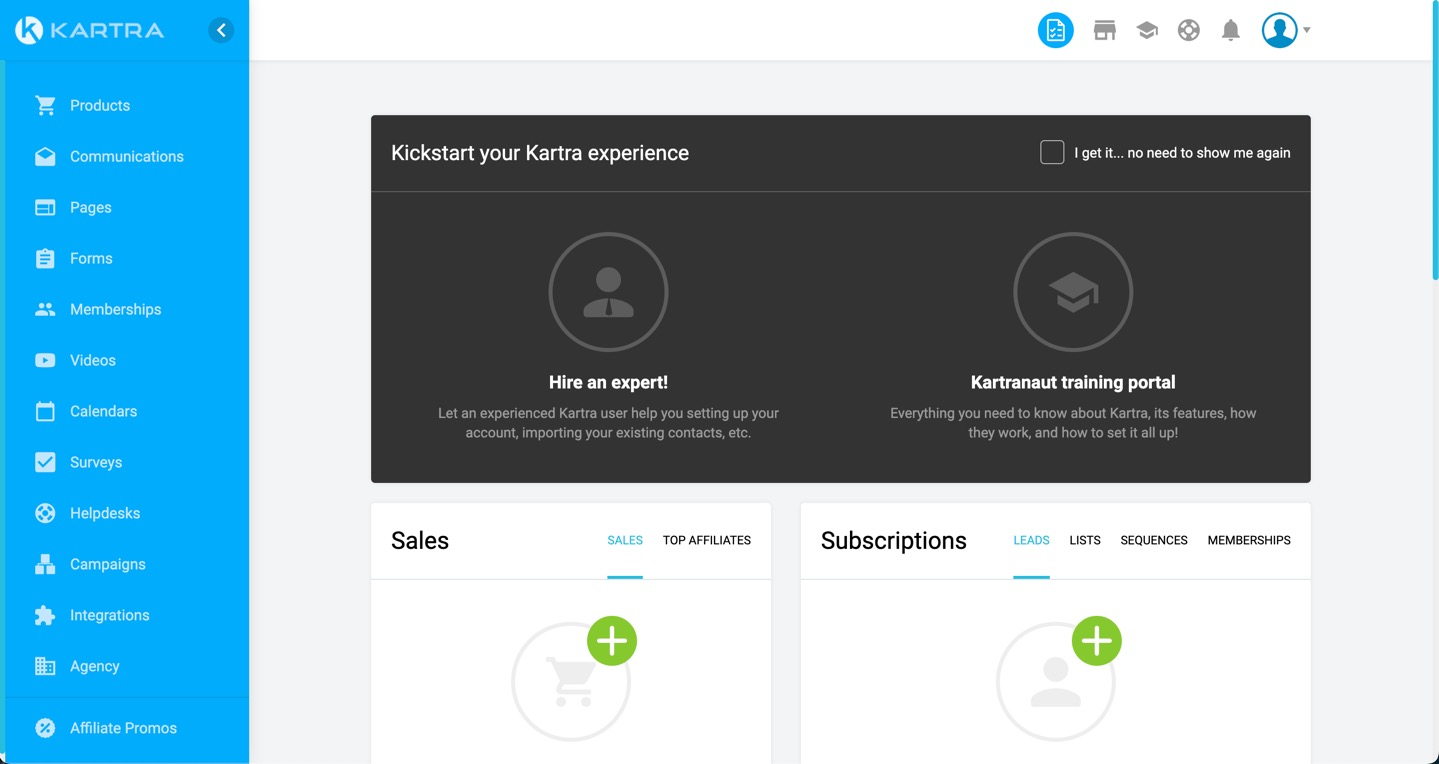
Kartra is another popular platform for creating and selling digital and physical products, and it offers a range of features that can help users build successful online businesses. Here are some of the key features of Kartra:
Website Building
Kartra’s website builder allows users to create professional, mobile-responsive websites with ease, including landing pages, sales pages, and more.
Email Marketing
Kartra’s email marketing tool makes it easy to create and send targeted email campaigns to subscribers and customers, with customizable templates, automated sequences, and detailed analytics.
Membership management
With Kartra, users can easily create and manage membership sites, including drip-fed content, custom login pages, and more.
Payment Processing
Kartra offers robust payment processing features, including support for multiple payment gateways, one-click upsells, and subscription billing.
Sales Funnels
Kartra’s drag-and-drop funnel builder makes it easy to create high-converting sales funnels that guide prospects through a series of steps to purchase a product or service.
How We Compared Kartra and Kajabi
To compare Kartra and Kajabi, we evaluated each platform based on a range of important criteria. Here are the 15 most important categories we used to compare the two platforms:
- Online Course Creation
- Website Building
- Email Marketing
- Membership Site Management
- Sales Funnels
- Payment Processing
- Affiliate Management
- Integrations
- Customer Support
- Reporting and Analytics
- Security
- Multi-User & Client Management
- User Interface
- Customizability
- Scalability
By evaluating each platform based on these categories, we were able to get a comprehensive understanding of their strengths and weaknesses and determine which platform might be the best fit for different types of businesses and online entrepreneurs.
1. Course Creation
Based on our comparison of Kartra and Kajabi, when it comes to online course platforms, Kajabi has the edge. Kajabi’s online course platform offers an intuitive and user-friendly course creator, making it easy to create and manage courses without any prior technical knowledge.

Like Kartra, Kajabi also offers a wide range, of course, customization options, including the ability to add multimedia elements like videos, quizzes, and surveys, which can help create engaging and interactive learning experiences for students.
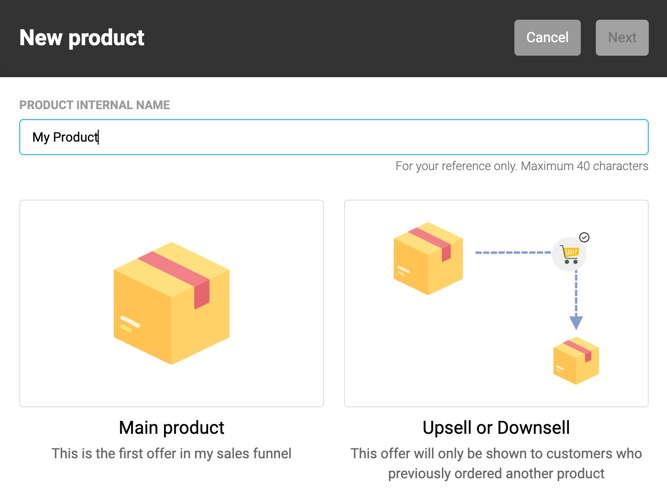
Kartra has a strong online course platform including student engagement features, but it may not be as user-friendly or as easy to navigate as Kajabi’s platform.
Additionally, Kartra’s course creation tools may not be as customizable as Kajabi’s, which could limit the flexibility and creativity of your course content.
Overall, if you are looking for the best online course platform and you want something easy to use and highly customizable, Kajabi is the better choice.
2. Website & Landing Page Building: Kartra vs Kajabi
Both Kartra and Kajbi offer you the option to build a website right from within their platform.
They each offer hosting so you don’t need to bring your own web server. Of course, they both allow you to connect your own custom domain, as any website builder should.

Based on our comparison though, we found that Kartra has a slight edge over Kajabi when it comes to website building. Kartra’s website builder is highly customizable and offers a wide range of design options, including pre-built templates and drag-and-drop functionality.
The platform also has a visual editor that allows you to easily create and modify pages on your website without any coding knowledge. While Kajabi also has a website builder, it may not be as flexible or customizable as Kartra’s.

Kajabi’s website builder is geared more toward creating landing pages for courses and products, rather than building an entire website from scratch. While Kajabi does offer a range of website themes and templates, users may find them limiting in terms of design flexibility and customization.
It is worth mentioning that both allow you to use custom domains, as any good website builder should.
Overall, if website building is a priority for you and you want a platform that offers a high degree of customization and design flexibility, Kartra is the better choice.
3. Email Marketing: Kajabi vs Kartra
When it comes to email marketing, both Kartra and Kajabi offer robust email marketing features, but there are some differences between the two platforms.
Kajabi has a very user-friendly and intuitive email marketing system. It offers a drag-and-drop email editor that allows you to create visually appealing emails without any coding skills.

Kajabi also offers a range of email templates and automation features, including the ability to create automated email sequences, segment your email list, and send personalized emails based on subscriber behavior.
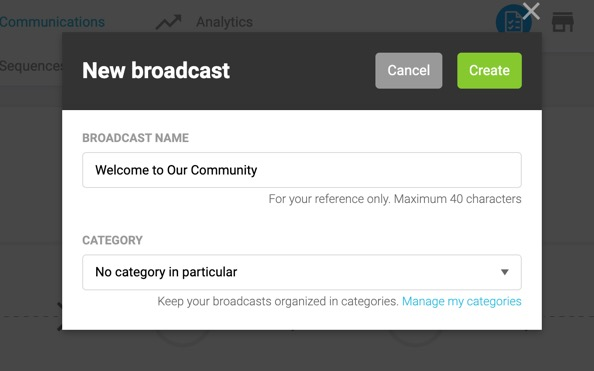
Kartra also offers a strong email marketing feature set with Kartra Mail, which includes a visual email builder, email automation, and the ability to segment and tag subscribers.
One unique feature of Kartra Mail is its behavioral analytics, which encourages behavioral adaptive marketing by helping you understand how subscribers interact with your emails so you can tailor your marketing efforts accordingly.
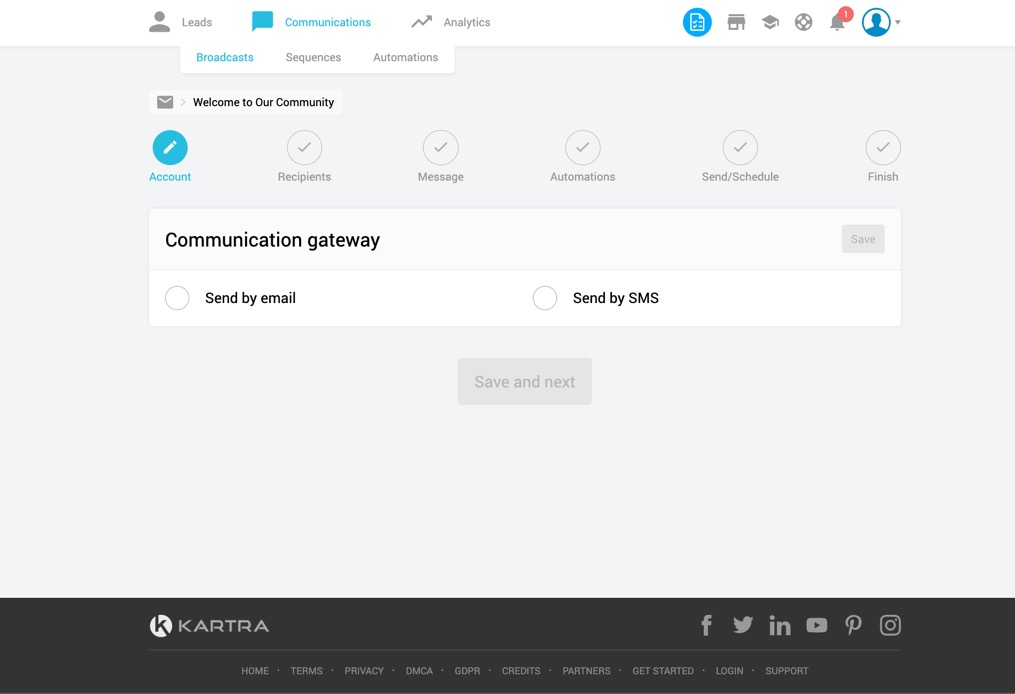
However, one downside in general to all-in-one marketing solutions is that they are often Swiss Army knives when you need a jigsaw. In those instances, we might suggest you use a dedicated email-marketing platform such as Active Campaign of MailChimp instead.
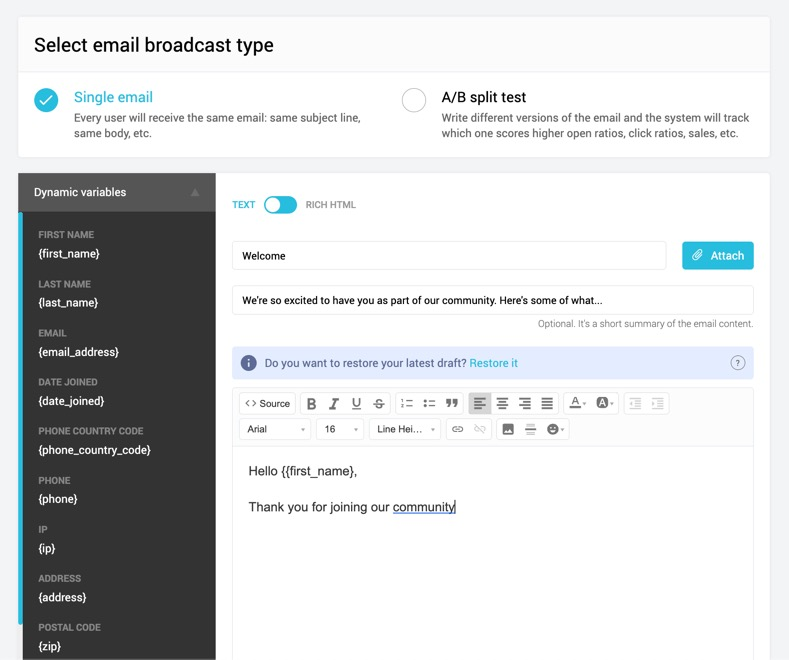
However, both platforms do offer powerful email marketing features. Out of the two, we think Kajabi may be the better choice for those who prioritize ease of use and intuitive design, while Kartra may be better for those who want more advanced analytics and automation options.
4. Membership Sites
Based on our comparison, Kajabi and Kartra offer strong membership site builder tools, but there are some differences among the two.
Kajabi’s membership management, like Kartra, is intuitive and user-friendly. It allows you to easily create and manage membership sites. Kajabi also offers a wide range of customization options, including the ability to customize your membership site’s branding, layout, and design.
Kartra’s membership site builder is also strong, with the ability to create multiple membership tiers, content dripping, and the ability to assign tags to users based on their membership level.
Overall, if you prioritize membership site creation and want a platform that is easy to use and highly customizable, Kajabi is the better choice between both platforms. However, if you need more advanced site features, like multiple membership tiers and content dripping, Kartra may be the better choice.
5. Sales Funnel Building: Kartra vs Kajabi
Kajabi and Kartra both offer powerful marketing features that can be used as sales funnel creation tools, but there are some differences between the platforms.
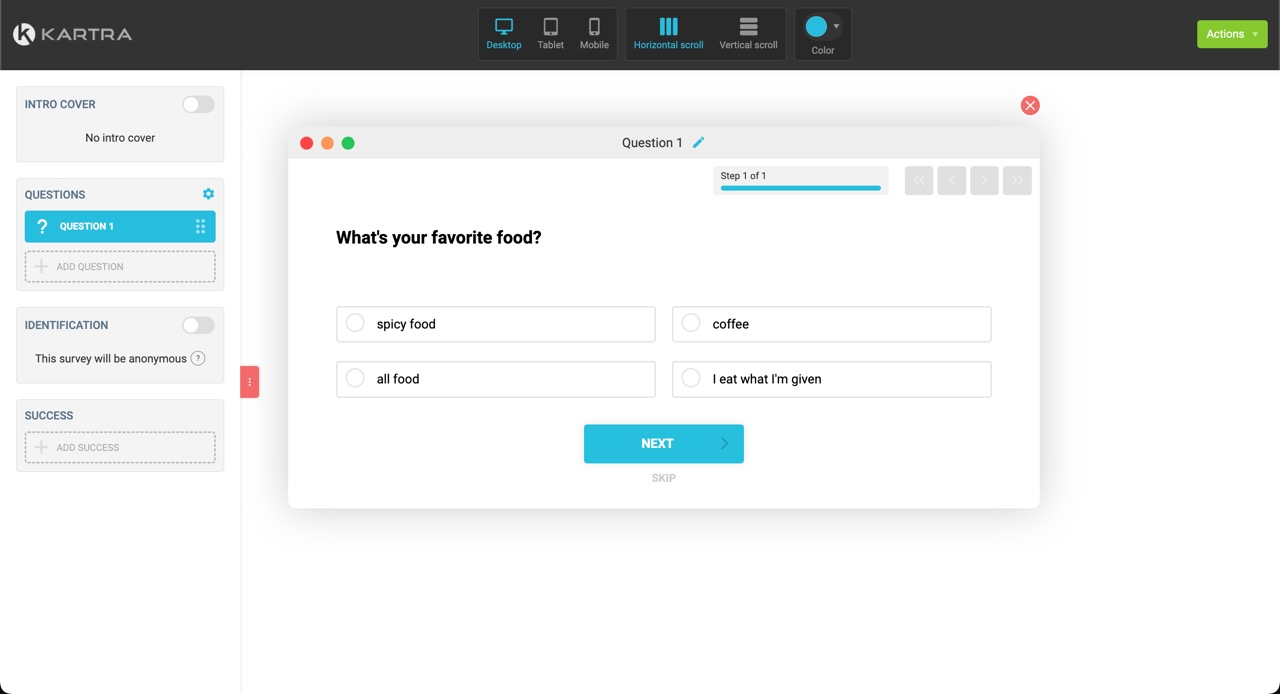
Kajabi’s sales funnel creation is straightforward and easy to use. It offers a range of templates and a drag-and-drop builder that allows you to quickly create sales funnels for any marketing campaign, without any coding skills. Kajabi also offers a range of customization options, allowing you to tailor your sales funnel to your specific needs.
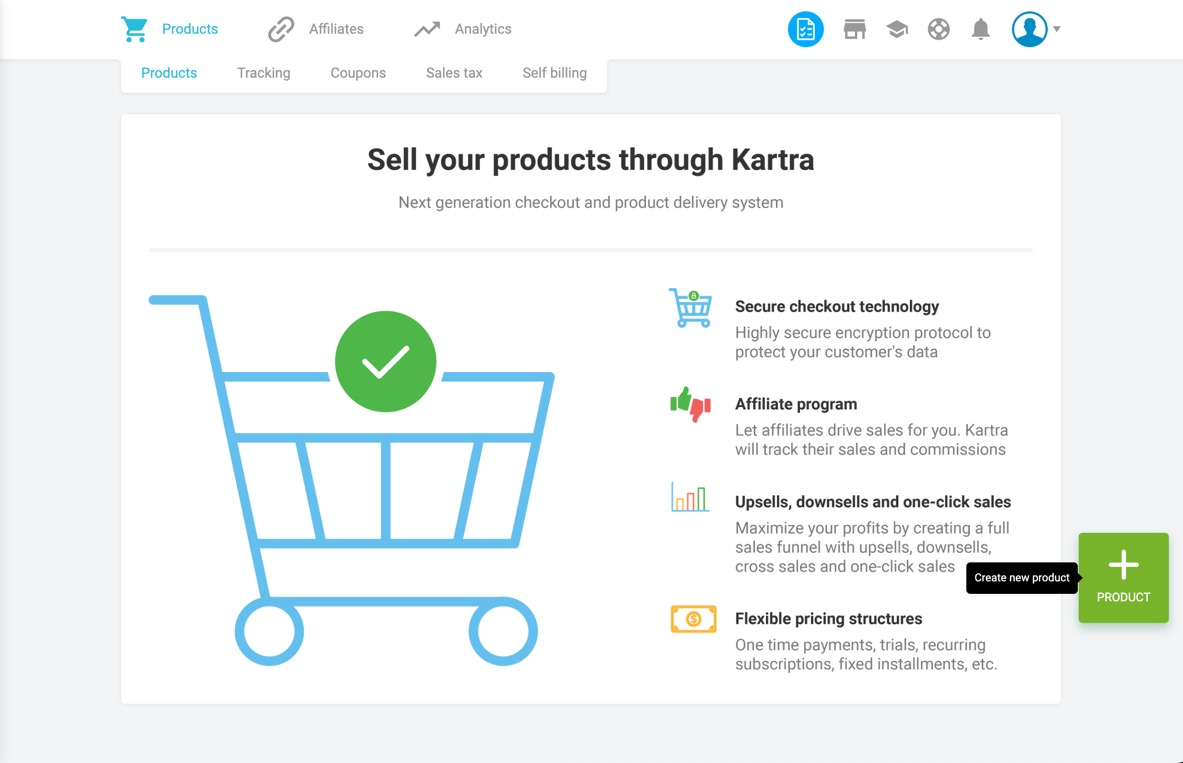
Kartra’s sales funnel creation tools are also strong, with the inclusion of Kartra Leads, to the ability to create a range of funnel types, including product launch funnels, list builder funnels, and more.
Additionally, Kartra’s sales funnel creation tools integrate with its entire email marketing workflows and membership management tools, making it easy to manage your entire sales process in one place.
Overall, both platforms offer strong sales funnel creation tools, but Kartra may be the better choice for those who want more advanced options and integrations. On the other hand, Kajabi may be the better choice for those who prioritize simplicity and ease of use.
6. Payment Collection: Kartra vs Kajabi
Both Kartra and Kajabi offer payment processing capabilities, allowing you to easily accept payments for your courses, products, and services. However, there are some differences between the checkout pages on the two platforms.
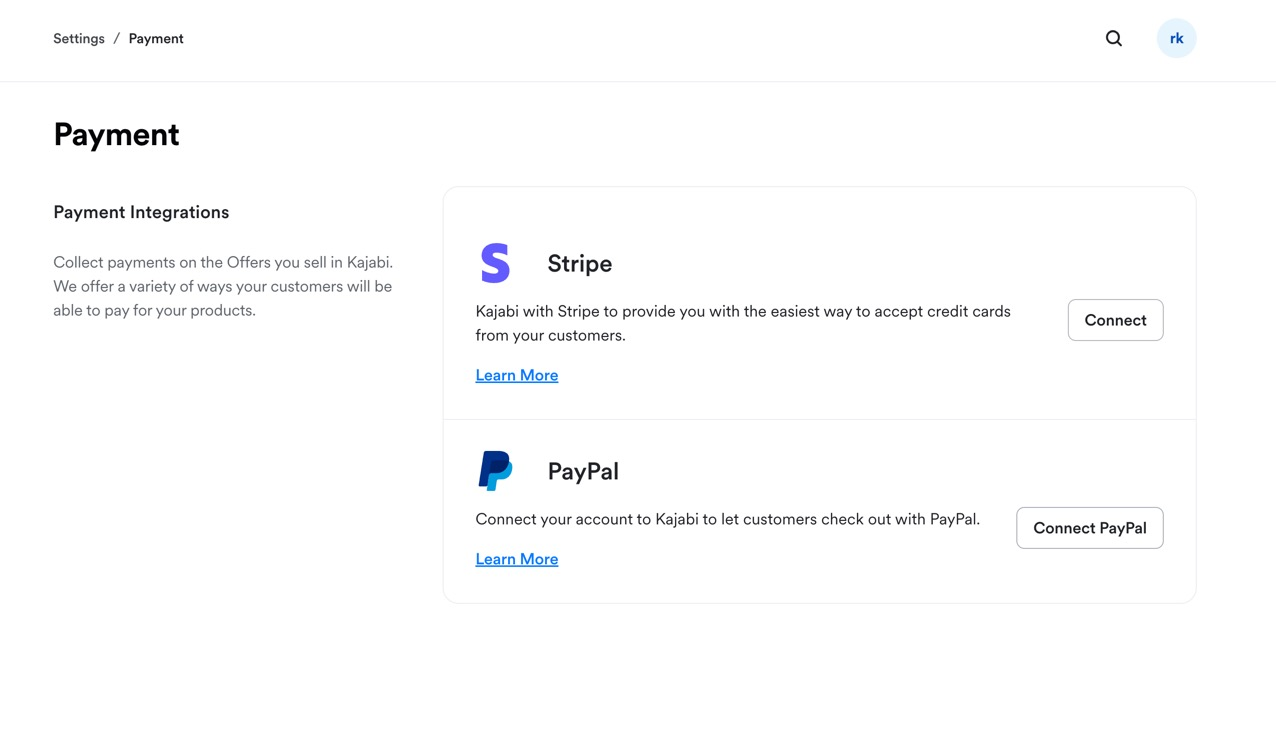
Kajabi supports payment processing through PayPal and Stripe. It allows you to create one-time payments, payment plans, and subscription payments. Kajabi also supports coupons and discounts and offers integration with tax software.
Kartra also supports payment processing through multiple payment gateways, including instant PayPal payments, Stripe, Authorize.net, and Braintree. It allows you to set up one-time payments, payment plans, and subscriptions with ease.
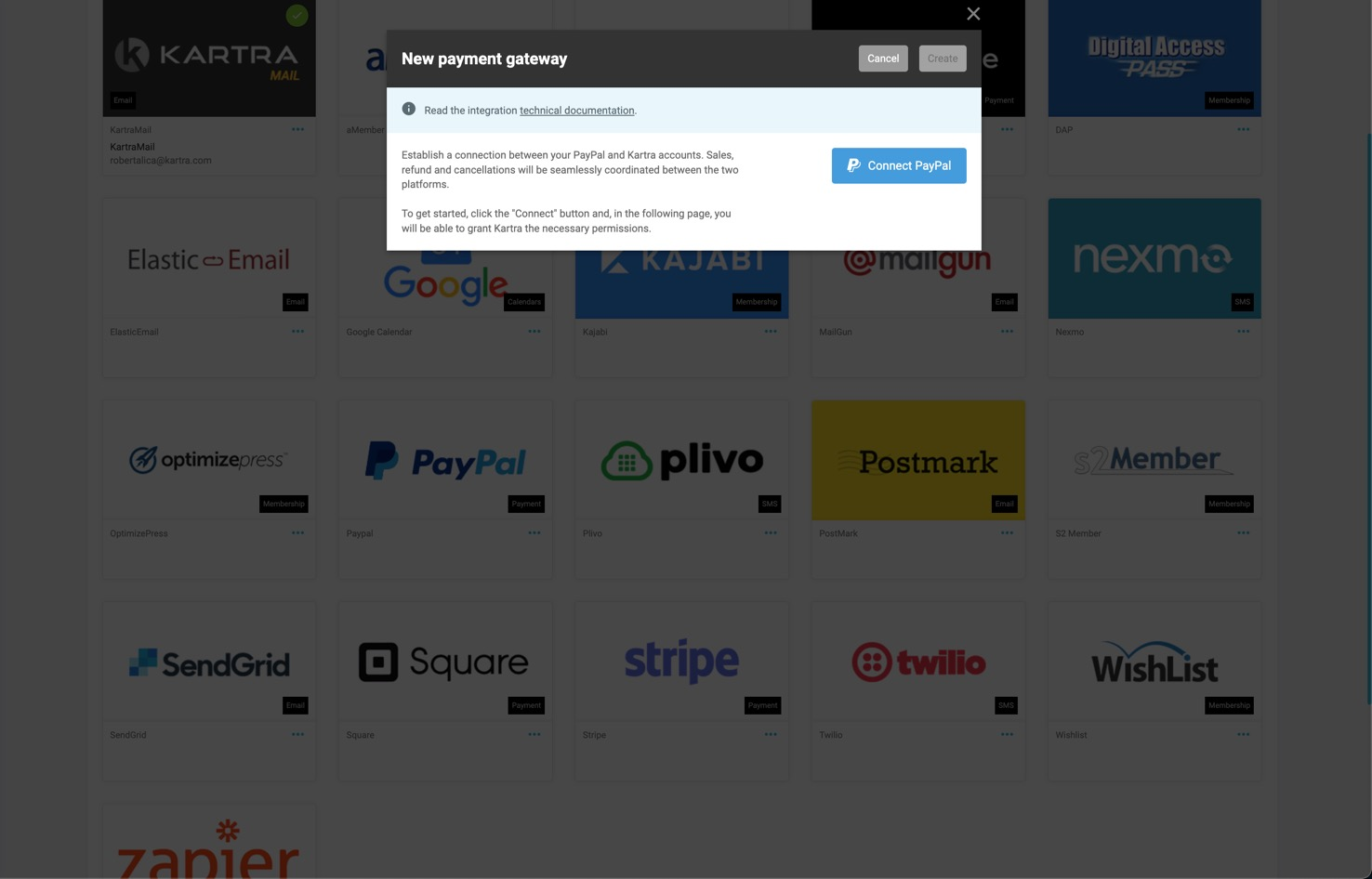
Kartra also offers advanced payment features like upsells, down sells, and order bumps to maximize your revenue. Overall, both platforms offer robust payment processing capabilities, but Kartra offers more payment gateway options and advanced payment features compared to Kajabi.
7. Affiliate Marketing
Both Kajabi and Kartra offer affiliate marketing capabilities, but there are some differences between the two.
Unlike Kartra, Kajabi’s affiliate program is relatively simple but effective. It allows you to set up affiliate links for your products and courses and track your affiliates’ performance. Kajabi also offers customization options for affiliate payouts and an easy-to-use interface.
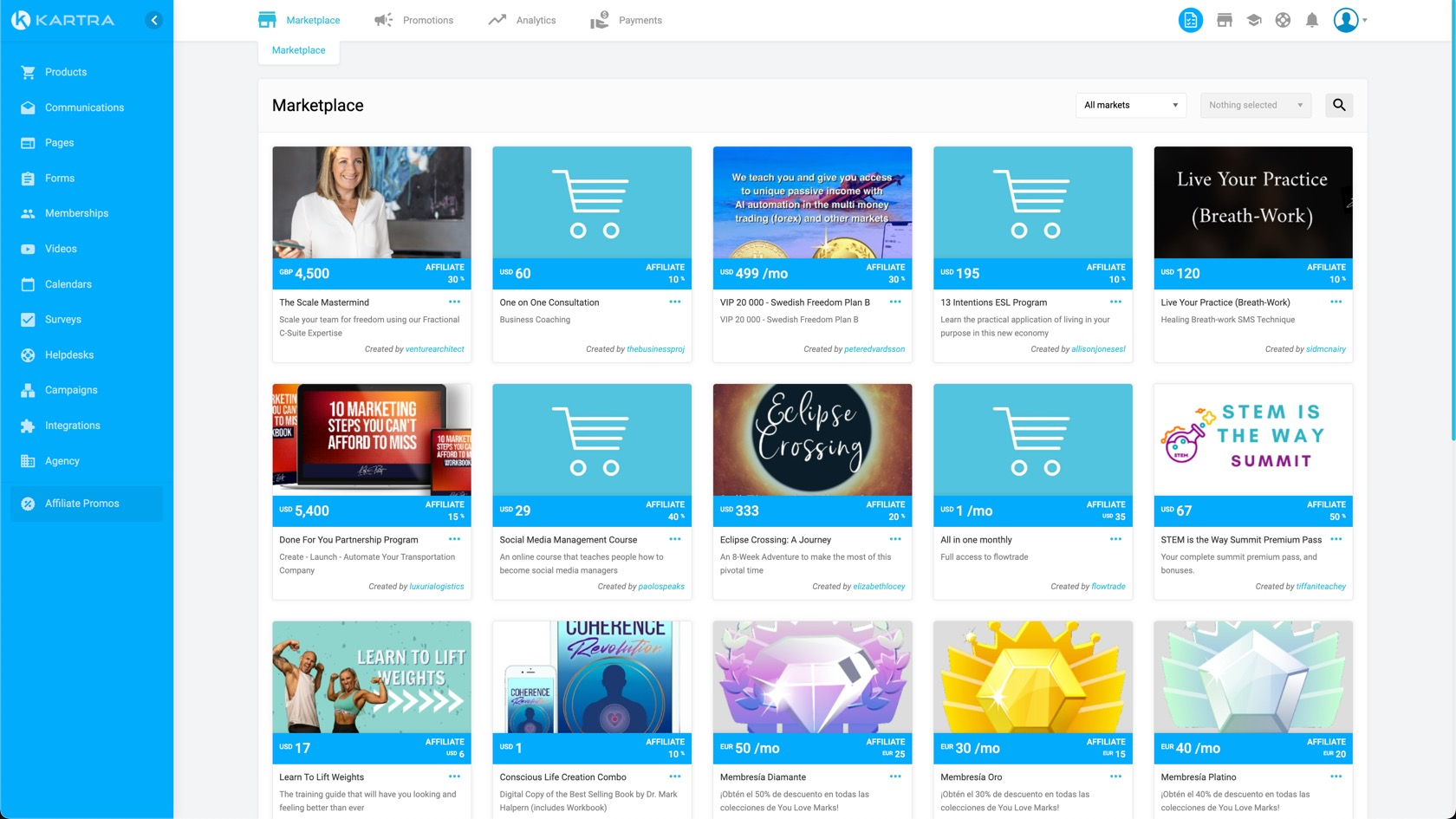
Kartra’s affiliate program is more advanced. It has the ability to manage and track affiliates, create multiple commission tiers, and set up automated payouts. It also integrates with its membership site creation tools, making it easy to set up and manage affiliate programs.
One thing to note is that Kartra’s affiliate marketplace was full of items that are not likely to convert leads you send their way. While we like the idea of an affiliate marketplace, Kartra’s doesn’t seem to be one we would recommend.
Overall, both platforms offer solid, affiliate marketing features and capabilities, but Kartra is the better choice for those who prioritize advanced affiliate management features and automation.
However, if you want a simpler option that is easy to use and customize, Kajabi may be the better choice.
8. Integrations: Kartra vs Kajabi
Third-party integrations are essential as they allow you to connect different tools and services together to create a more streamlined workflow. Here’s how Kajabi and Kartra compare when it comes to integrations:
Kajabi offers integrations with several third-party tools, including email marketing platforms like Mailchimp and ConvertKit, payment gateways like PayPal and Stripe, and webinar software like Zoom and WebinarJam.
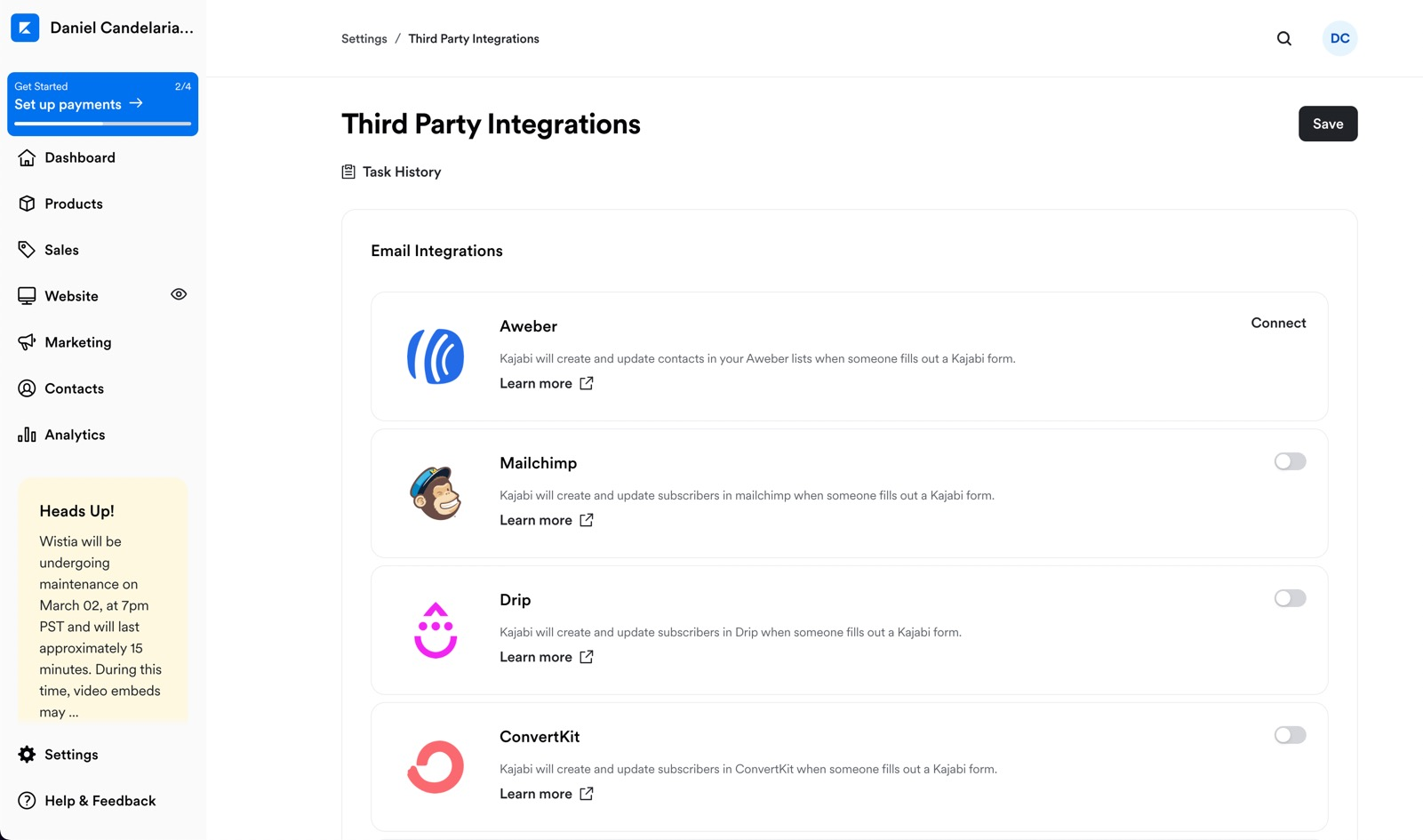
Kajabi also has an open API, allowing you to connect with other tools that are not natively supported.
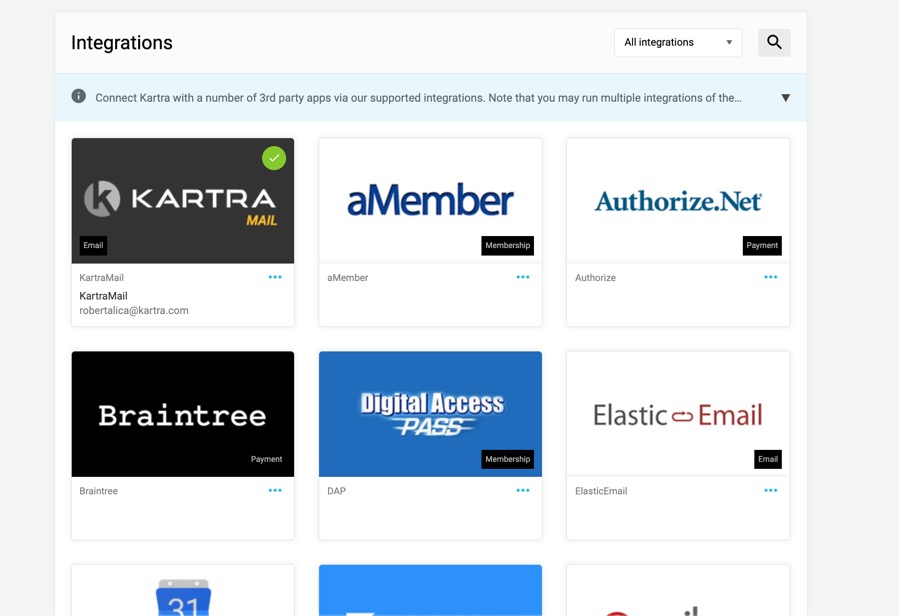
Kartra, on the other hand, offers a wide range of integrations with third-party marketing tools too, including email marketing platforms like Mailchimp, ActiveCampaign, and AWeber, payment gateways like PayPal, Stripe, and Authorize.net, and webinar software like Zoom, WebinarJam, and GoToWebinar.
In addition, Kartra has a built-in affiliate management system, allowing you to easily manage your affiliates and track their performance.
Overall, both platforms offer integrations with popular third-party tools, but Kartra offers more options and a built-in affiliate management system.
9. Customer Support
Having reliable and responsive customer service is crucial when it comes to running an online business, both in terms of getting support when you need it, and providing support to your users when they need it.
Kajabi offers email support and live chat support. They also have a comprehensive knowledge base with articles, tutorials, and videos to help you with any issues you may encounter. Kajabi also has a Facebook group where you can connect with other Kajabi users and get help from the community.

Lastly, Kajabi offers their users access to Kajabi University, which offers courses that teach you both technical and business tips for growing your online business.
Kartra also offers email and live chat support with Kartra helpdesk, but they go a step further by providing phone support during business hours. Should you need to contact Kartra’s support team, they also have a knowledge base with articles, tutorials, and videos to help you with any issues you may encounter.
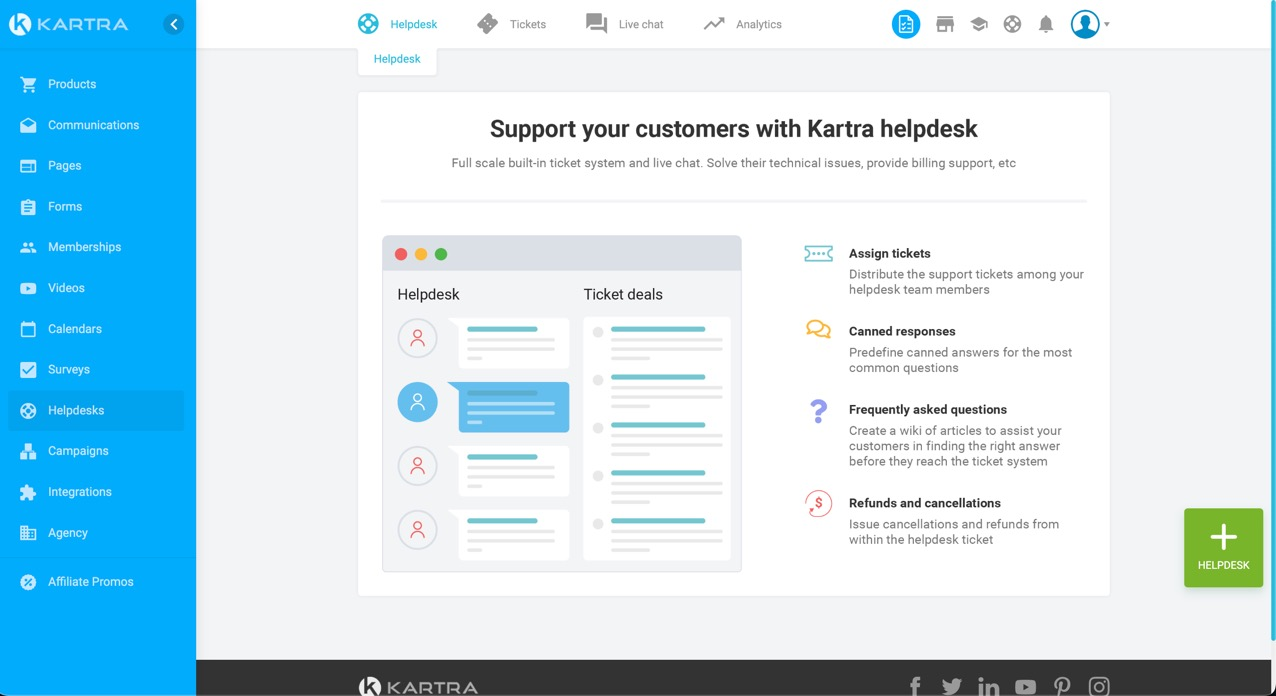
In addition, Kartra has a Facebook group and a community forum where you can connect with other Kartra users and get help from the community.
Overall, both platforms offer all the tools for reliable customer service through email and live chat, but Kartra goes a step further by providing phone support during business hours.
Kartra also includes features that allow you to provide better customer support with their helpdesk feature. With Kartra you can opt to offer your own chat support if you wanted to.
It’s also worth mentioning they also have community features like a community forum where you can connect with other users and get help from the community.
10. Reporting and Analytics
In order to make informed decisions about your online business, it’s important to have access to detailed reporting and analytics.
Kajabi offers detailed reporting and analytics on course progress, sales, revenue, and user engagement. They also have a dashboard that displays key metrics at a glance, making it easy to track your business’s performance.
Additionally, Kajabi integrates with Google Analytics, allowing you to track website traffic and user behavior.
Kartra offers detailed reporting and analytics on sales, split testing, email campaigns, and surveys. Overall, both Kartra and Kajabi offer robust reporting and analytics features, allowing you to track key metrics and make informed decisions about your business.
11. Security
Security is an important aspect of any online business. It is essential to ensure that your platform is secure to protect your customers’ data and your own business’s information.
Kajabi takes security seriously and has implemented several measures to ensure the safety of its users’ data. They use SSL encryption to protect user data during transmission; they store data in a secure, password-protected database.
Additionally, they use a two-factor authentication system to add an extra layer of security to user accounts.
Just like Kajabi, Kartra places great emphasis on the security of its users’ data and has implemented several measures to safeguard it. User data is protected during transmission using SSL encryption, and stored in a secure, password-protected database.
Kartra also has a feature called Kartra Guard that monitors user accounts for unusual activity and sends alerts if suspicious behavior is detected.
Overall, both platforms have robust security features to protect user data. While Kajabi’s two-factor authentication system adds an extra layer of security, Kartra Guard’s ability to monitor user accounts for unusual activity gives it a slight edge over Kajabi.
12. Multi-User and Client Management
Agency management is a surprise feature offered by Kartra, and although you have to pay more for it on the Kartra starter plan, it’s included as part of the Kartra Silver, Kartra Gold, and Kartra Platnum plans.
Kartra Agency is a dedicated software solution that aims to assist users in creating successful marketing campaigns for their clients through a comprehensive marketing platform.
Those who provide marketing services using Kartra as their main marketing platform will find this feature useful, users can manage less login credentials overall while maintaining separate reporting for each individual business relationship.
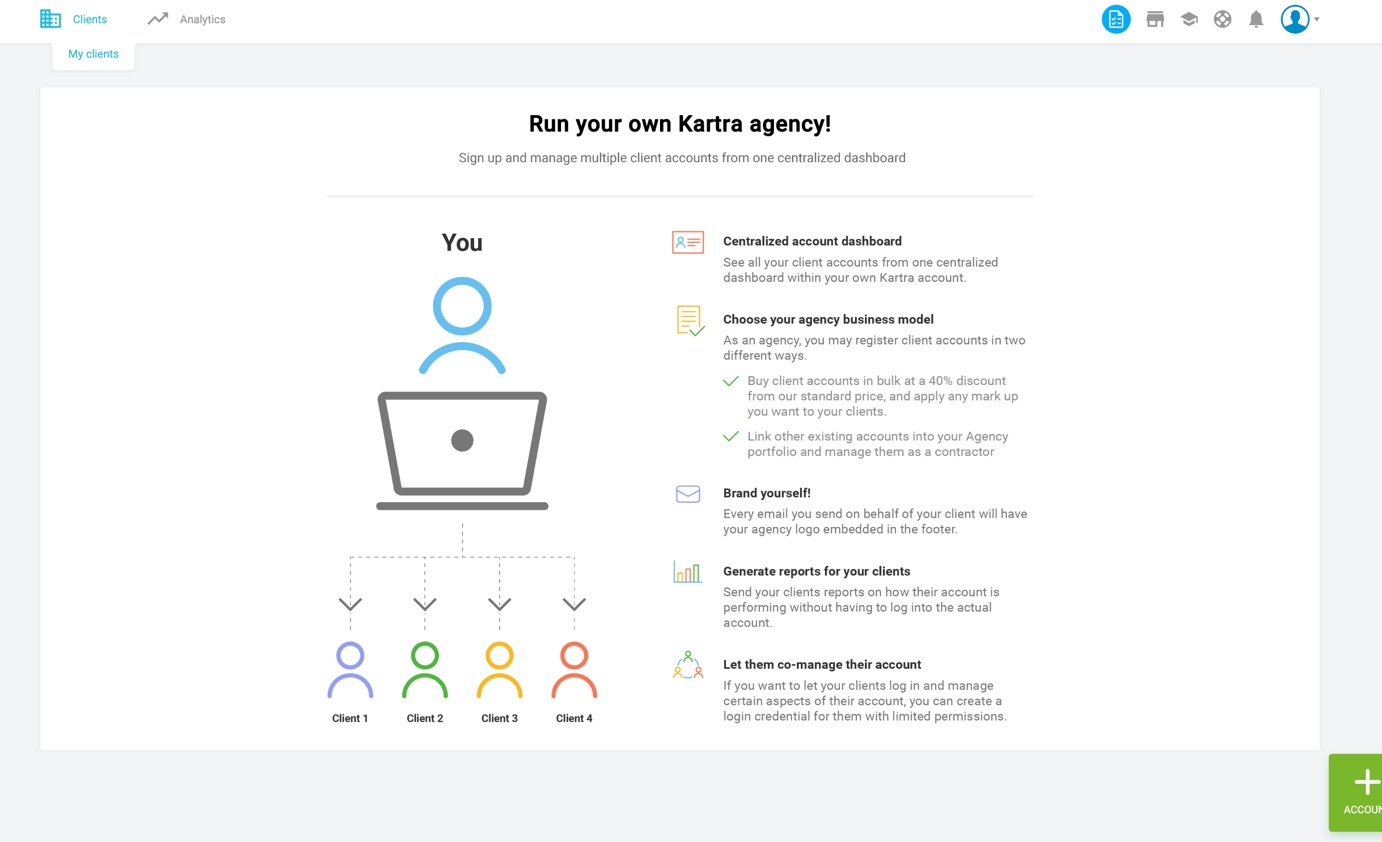
Overall, while we do like that Kartra included this feature, it really is only applicable for service providers who opt to use Kartra for these services. Also, while it does save you a few clicks and logins to switch between client accounts, it’s not exactly a game-changing feature.
Nonetheless, we do have to give Kartra the edge here as they’ve at least considered this scenario and made it just a bit easier to manage marketing work without sharing account credentials.
13. User Interface
Overall, we found the user interface of both platforms to be intuitive and user-friendly. Nevertheless, they differ in their design and customization options.
Kajabi’s user interface is simple and easy to navigate, with a clean and modern design. It offers customization options for your website’s design and page templates, but the options are limited compared to other website builders.
Kajabi’s focus is on delivering a seamless course and selling experience, with drag-and-drop builders and easy-to-use navigation. On the other hand, Kartra’s user interface is more comprehensive, with a variety of customization options for your website design and page templates.
Kartra has a wide range of templates and design options, allowing for greater flexibility in creating a unique website. Kartra’s interface also includes a visual automation builder, making it easy to create a sales funnel and marketing campaigns.
Ultimately, both platforms offer user-friendly interfaces that are easy to navigate, but the level of customization and design options may vary.
If you’re looking for a simple and straightforward platform, Kajabi’s interface may be more suitable. However, if you’re looking for greater design flexibility and customization options, Kartra may be the better choice.
14. Customizability
Both solutions offer a range of customization options, such as custom themes and blogging features, but they differ in their level of flexibility and control over design and functionality.
Kajabi offers some customization options for website design and page templates, but they are relatively limited. Kajabi’s focus is on providing a streamlined course development and selling experience, with a drag-and-drop builder and easy-to-use navigation.
Kajabi does offer a range of customizable themes, allowing you to create a unique look and feel for your website. However, Kartra offers more customization options, including a wide range of website templates and design elements that can be customized to fit your brand.
Kartra also includes a visual automation builder, making it easy to create a complex sales funnel and marketing campaigns. In terms of customizability, Kartra offers greater flexibility and control over design and functionality, making it a better choice for those who need more customization options.
However, Kajabi’s streamlined approach may be a better fit for those who want a simpler, more straightforward platform.
15. Scalability
Both platforms are scalable platforms, but they differ in their approach to scaling.
Kajabi is primarily designed for course creators and entrepreneurs who are just starting out. While the platform offers some features pertinent for scaling, such as advanced automation, it is primarily focused on providing a streamlined experience for selling and delivering online courses.
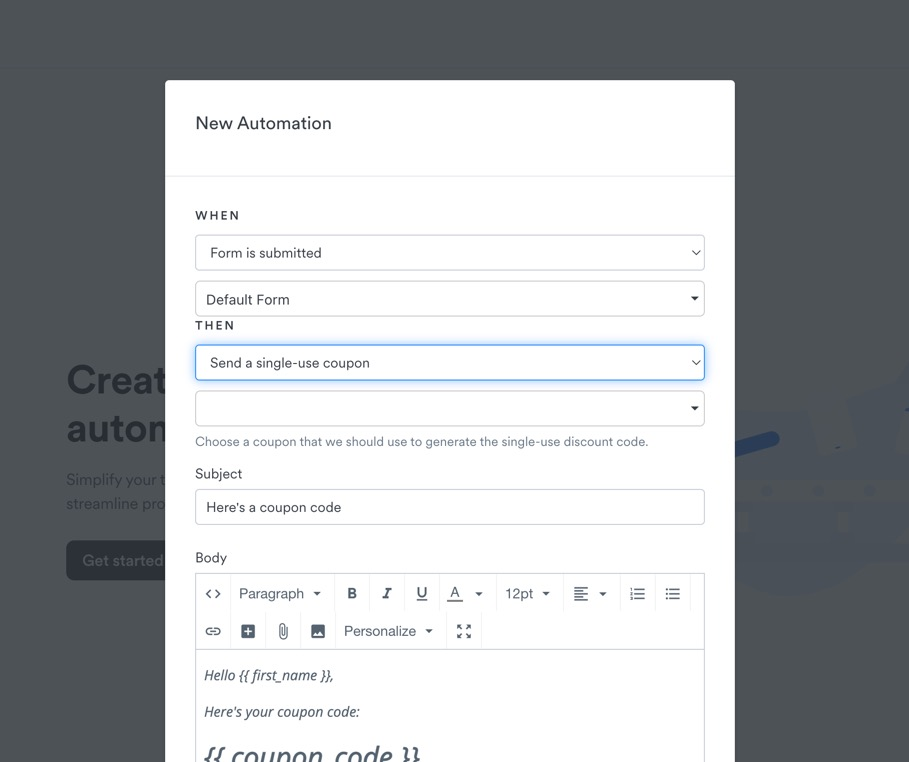
As your business grows, Kajabi can still be used, but you may need to purchase additional features or upgrade to a higher pricing plan to accommodate your needs.
However, Kartra is designed to be a more comprehensive business platform. It offers advanced features for email marketing, marketing automation, affiliate management, and more, making it a more scalable option for businesses that are looking to grow quickly.
Additionally, Kartra offers a wide range of pricing plans, so you can start with a lower tier and upgrade as your business expands.
In terms of scalability, Kartra offers more advanced features and a wider range of pricing plans, making it a better choice for businesses that are looking to scale quickly. Kajabi, on the other hand, is a great option for those just starting out and looking for a streamlined platform.
16. Video Hosting
Both Kartra and Kajabi can host video, but there are a few keen differences of the two:
Kartra offers a bit more thought and customization here than Kajabi and has productized its video hosting with Kartra Video. With Kartra Video, Kartra has paid a bit more attention to how video is handled on their platform, enabling Kartra users to choose whether videos auto-play, whether controls are shown, and other video-related minutiae. As part of this, Kartra offers unlimited video hosting, which is a big benefit for those that use lots of video.
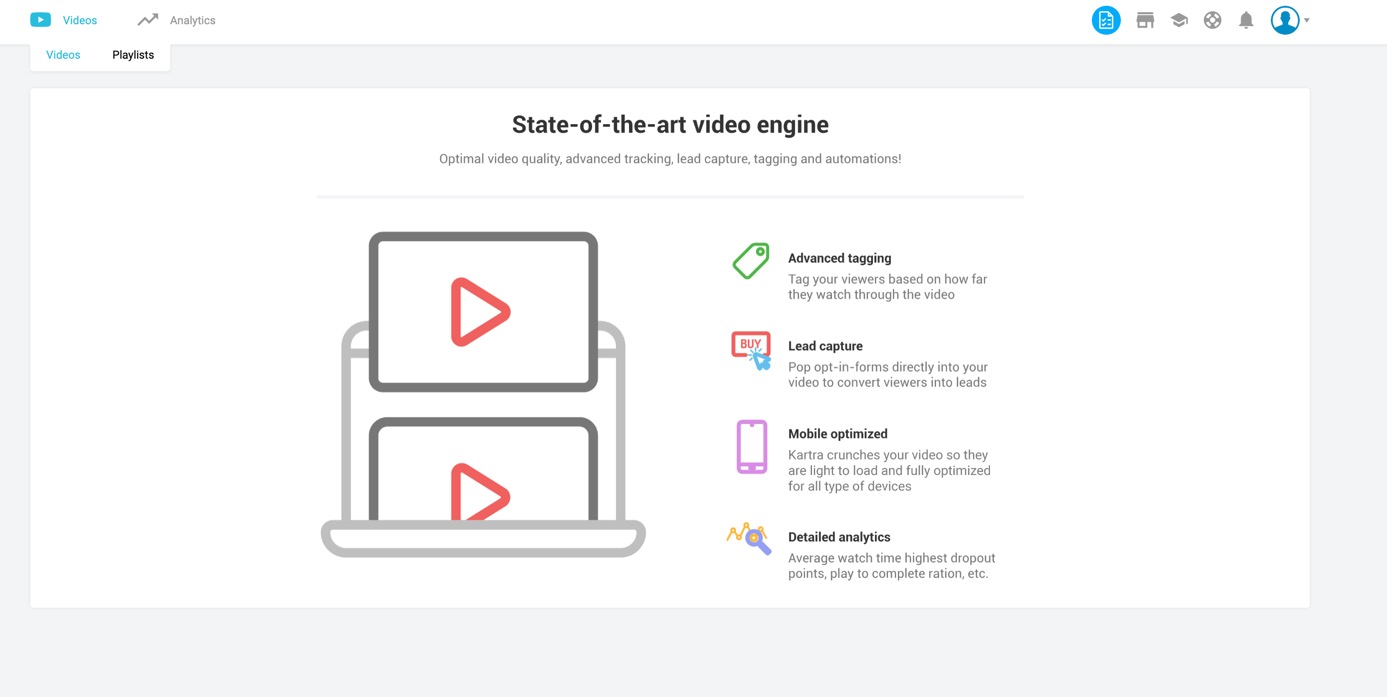
Meanwhile, Kajabi’s video-hosting is built into their products, allowing you to upload videos as part of an online course or other offering. While Kajabi doesn’t treat their video hosting as a standalone marketable service, it does in fact offer many of the same video-related features that Kartra offers. However, they’re not as comprehensive or useful if you use video often.
Overall, we appreciated the emphasis Kartra Video placed on video hosting, but apart from the interactive video features, we found that the difference in video capabilities between Kartra and Kajabi was minimal.
Pricing: How each platform stacks up on price
When it comes to pricing, each platform offers different options and plans to fit various business needs and budgets.
Kajabi Pricing Plans
Each plan includes different features and limitations, such as the number of products you can sell, the number of contacts you can have, and the amount of storage you get.
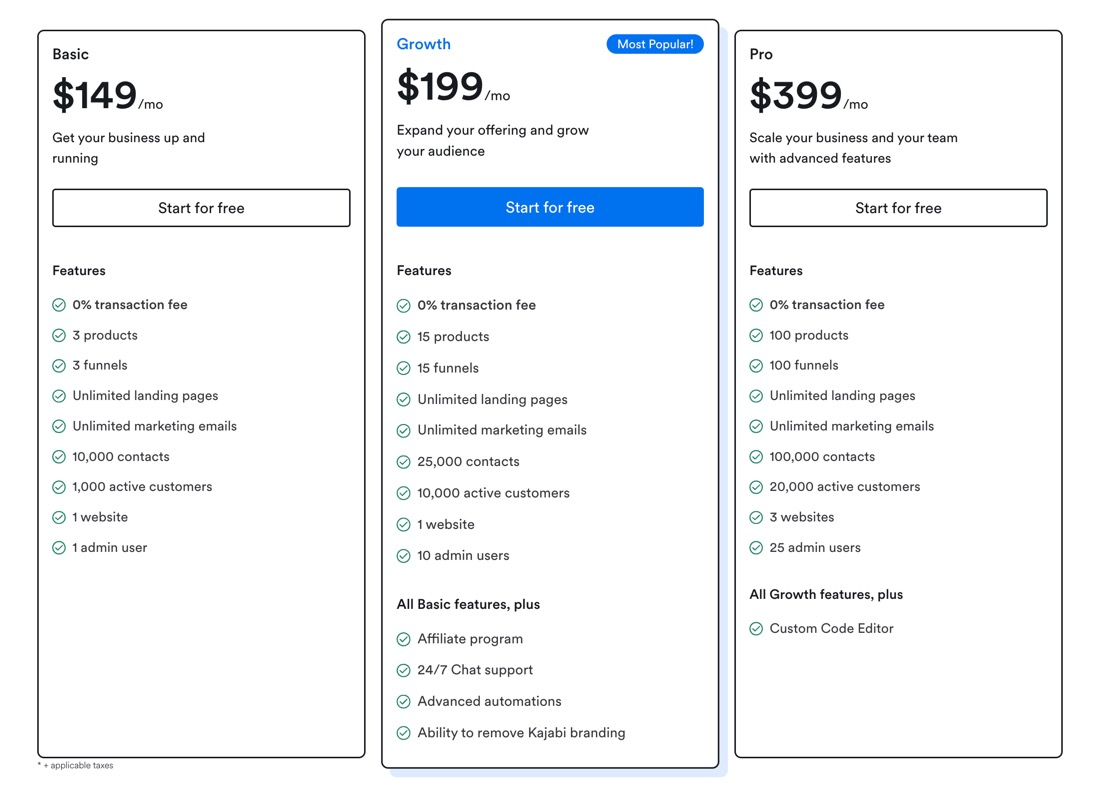
Kajabi Basic ($149/month)
The Basic Plan is the most affordable option for those who are just starting out with Kajabi. It costs $149 per month and includes unlimited landing pages, marketing emails, and membership sites, along with 10 products and 1,000 active members.
With this plan, you also get access to Kajabi’s website builder, basic analytics, and 24/7 customer support.
Kajabi Growth ($199/month)
The Growth Plan is the next level up and costs $199 per month. With the Growth Plan, you get access to all the features of the Basic Plan, along with unlimited products, 10,000 active members, and advanced automations.
You also get access to Kajabi’s affiliate program, which allows you to earn commissions by promoting Kajabi to others.
Kajabi Pro ($399/month)
The Pro Plan is the most advanced and expensive option, costing $399 per month. With the Pro Plan, you get access to all the features of the Growth Plan, along with up to 100,000 active members, advanced customization options, and priority customer support.
You also get access to Kajabi’s code editor, which allows you to make advanced customizations to your website and products.
Kartra Pricing Plans
Kartra users will find four pricing tiers. Each plan includes different features and limitations, such as the number of products you can sell, the number of contacts you can have, and the amount of bandwidth and storage you get.
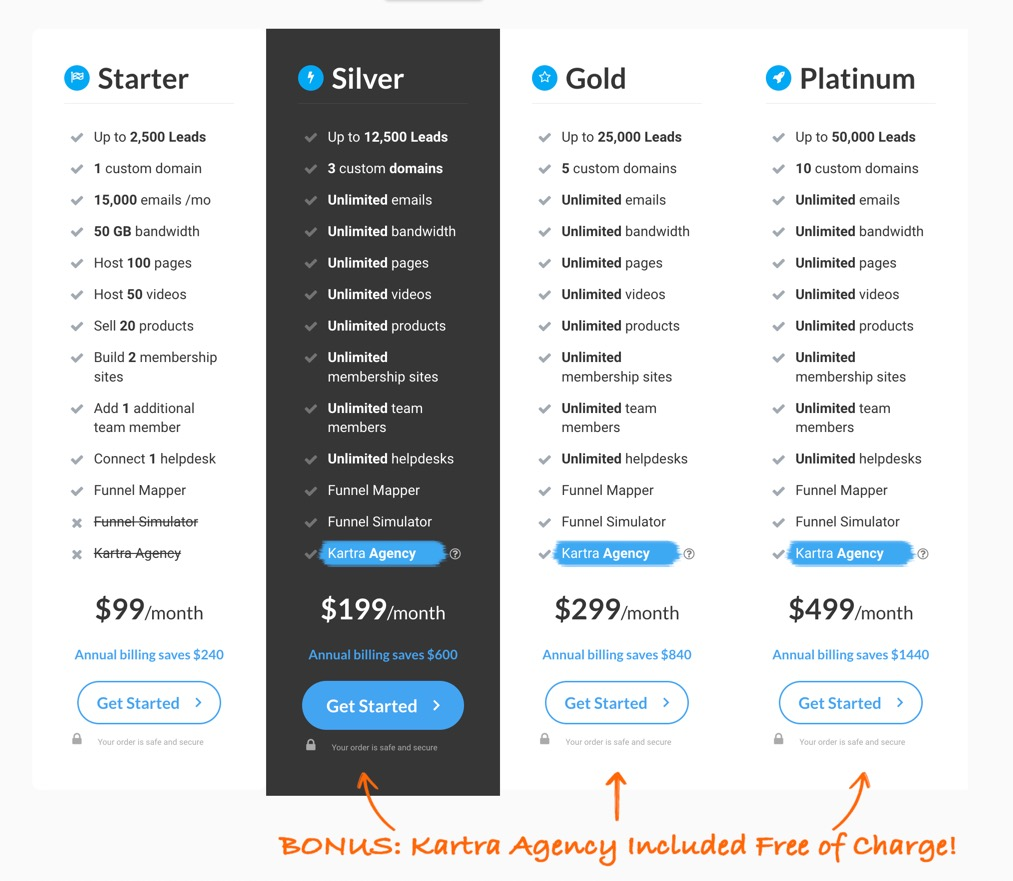
Kartra Starter ($99/month)
The Kartra Starter plan costs $99 per month and offers access to most of the platform’s features, including up to 2,500 contacts, 15,000 emails per month, 100 pages, 50GB bandwidth, and one custom domain. This plan is ideal for businesses that are just getting started and have a limited number of contacts.
Kartra Silver ($199/month)
The Kartra Silver plan costs $199 per month and offers more features, including up to 12,500 contacts, 125,000 emails per month, unlimited pages and products, 125GB bandwidth, and three custom domains.
Overall, the Kartra Silver plan is ideal for businesses that are growing and need more advanced marketing automation and sales funnel capabilities.
Kartra Gold ($299/month)
At $299 per month, the Kartra Gold plan is a bit of a step up from the silver plan in terms of cost, and offers even more features, including up to 25,000 contacts, 250,000 emails per month, unlimited pages and products, 200GB bandwidth, and five custom domains.
This plan is suitable for larger businesses with high traffic volume and more complex marketing needs.
Kartra Platinum ($499/month)
The Kartra Platinum plan costs $499 per month and offers the most comprehensive set of features, including up to 50,000 contacts, 500,000 emails per month, unlimited pages and products, 500GB bandwidth, and ten custom domains.
This plan is ideal for larger businesses that need the highest level of marketing automation and customization options. When it comes to pricing, Kartra’s Starter plan is cheaper than Kajabi’s Basic plan, but it comes with fewer features and limitations.
We found that Kartra’s starter plan was great if you have very limited needs, but in general, most businesses will end up needing to upgrade at some point.
On the other hand, Kajabi’s Pro plan is more expensive than Kartra’s Platinum plan, but it includes more features and higher limitations.
It is important to evaluate your business needs and budget carefully and compare each feature and the limitations of each platform’s plans to choose the one that best fits your requirements.
Where each platform shines, and where each falls short
There are some pros and cons of both Kartra and Kajabi based on our comparison:
Kartra Pros:
- Comprehensive business platform with a wide range of features
- Advanced marketing automation capabilities
- Detailed analytics and reporting
- Affordable pricing plans for small to medium-sized businesses
- Great for scaling quickly
Kartra Cons:
- Steep learning curve for beginners
- Limited customization options for website design
- Some users have reported glitches and technical issues
Kajabi Pros:
- Streamlined platform with a focus on course creation
- User-friendly interface for beginners
- Excellent customer support
- Offers a wide range of templates for website design
- Good for smaller businesses and entrepreneurs
Kajabi Cons:
- Limited marketing automation features
- No built-in affiliate management system
- Higher pricing plans can be expensive for some users
- Not as comprehensive as Kartra for businesses looking to scale quickly
Overall, both platforms offer their own unique strengths and weaknesses, so the choice ultimately comes down to your specific business needs and preferences. If you are looking for a comprehensive business platform with advanced marketing automation capabilities and detailed analytics, Kartra may be the better choice.
However, if you are primarily focused on course creation and want a streamlined platform with excellent customer support, Kajabi may be the better fit.
Our Final Verdict: Which is right for you?
After comparing the two platforms across a wide range of features and categories, it’s clear that both platforms offer their own unique strengths and weaknesses. So, which one is the best option for you and your business?
If you are looking for a comprehensive platform that offers a wide range of features and capabilities for scaling your business quickly, Kartra may be the better choice.
With its many advanced marketing features, automation, detailed analytics, and affordable pricing plans, Kartra is an excellent choice for businesses that want to grow quickly and efficiently.
However, if you are primarily focused on course creation and want a streamlined platform that’s easy to use and offers excellent customer support, Kajabi may be the better fit for you.
Kajabi’s user-friendly interface and range of website design templates make it a great choice for entrepreneurs and smaller businesses that want to create and sell online courses.
Ultimately, the best option for you will depend on your specific business needs, budget, and goals. We recommend carefully considering all of the features and capabilities of both platforms before making a decision.
Where to go next?
If you’re still unsure about which platform is the best fit for your business, don’t worry! There are plenty of resources available to help you make an informed decision.
In addition to this comparison of Kartra vs Kajabi, we also have a detailed comparison of Kajabi vs ClickFunnels that you may find helpful.

We will also be writing a detailed comparison to Mighty Network soon. This article takes an in-depth look at both platforms and compares them across a range of features and capabilities, helping you to make a more informed decision.
You can check out our head-to-head comparison of Kajabi and ClickFunnels.
With the right information, you can make an informed decision and choose the platform that will help your business grow and thrive.

